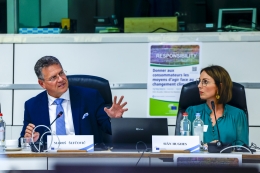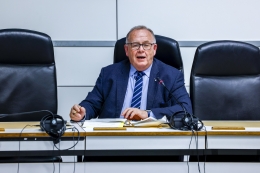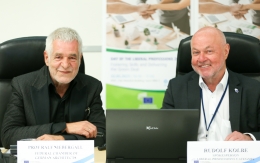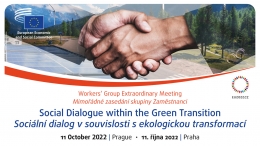European Economic
and Social Committee
Europese Green Deal
Op 11 december 2019 lanceerde de Europese Commissie de Europese Green Deal, die een extra impuls geeft aan het vastberaden streven van de EU om klimaat- en milieugerelateerde uitdagingen aan te pakken; dat is de belangrijkste taak van deze generatie. Het doel van de Europese Green Deal is de EU om te vormen tot een moderne, hulpbronnenefficiënte en concurrerende economie die er garant voor staat dat:
- er uiterlijk in 2050 geen sprake meer is van een netto-uitstoot van broeikasgassen;
- de economische groei is losgekoppeld van het gebruik van hulpbronnen;
- geen enkele persoon en geen enkele plaats wordt achtergelaten.
Voor de verwezenlijking van de Europese Green Deal voert de EU een uitgebreid pakket initiatieven uit, waaronder beleids- en wetgevingsvoorstellen en de ontwikkeling en modernisering van financieringsinstrumenten.
Onder verwijzing naar het nauwe verband tussen de Green Deal en sociale rechtvaardigheid dringt het EESC aan op een “Green and Social Deal”. Om ervoor te zorgen dat de duurzame en concurrerende bedrijven van morgen in een gezonde omgeving kunnen opereren is het van essentieel belang dat de stem van alle belanghebbenden wordt gehoord.
In de Europese Green Deal ligt de nadruk op investeringen en op de financiering van de groene en duurzame transitie. De Green Deal is Europa’s ontsnappingsroute uit de COVID-19-pandemie. De Green Deal wordt bekostigd door een derde van de 1,8 biljoen euro aan investeringen uit het herstelplan NextGenerationEU en de zevenjarige begroting van de EU. De bedoeling van al deze financieringsmogelijkheden is om de crisis aan te grijpen als een kans om de toekomst van Europa anders vorm te geven.
Het EESC speelt hierbij een cruciale rol: het houdt toezicht op de uitvoering van de initiatieven en maatregelen in het kader van de Europese Green Deal. Het EESC stelt adviezen op en organiseert activiteiten (zie het menu links op deze pagina) om ervoor te zorgen dat de EU-instellingen op de hoogte zijn van de standpunten van het maatschappelijk middenveld en dat de Green Deal-initiatieven stroken met de economische, sociale en maatschappelijke omstandigheden in het veld.
De Europese Green Deal is zo transversaal en allesomvattend dat alle afdelingen van het EESC en de CCMI zich ermee bezighouden.





